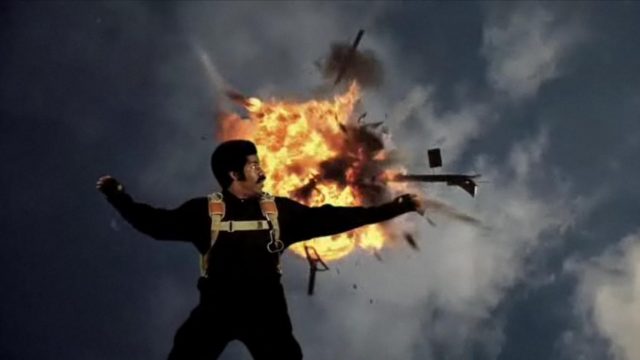If you like Film Observations
And lesbians at the bat
If you’re not into Stone Henge
If you think soaps are where it’s at
If you like movies by Ferrara
Helicopters in flames
The FAR is what you’ve looked for
Read the articles and escape.
Thanks to Miller and Rosy Fingers for contributing, may their old ladies never read the personal ads. Send articles throughout the week to ploughmanplods [at] gmail dot com, post articles from the past week below for discussion and Have a Happy Friday
Letterboxd talks to Will Slater, the Internet’s definitive expert on movies featuring exploding helicopters:
It was while watching the cheesily bad Cyborg Cop that I first had an epiphany about the weird and wonderful ways in which helicopters seemed to continually explode in movies. But the film that convinced me to start documenting the phenomenon was Stone Cold. If you’re not familiar with the film, it was an attempt to turn former gridiron star and mullet-king Brian Bosworth into the next big action star. It goes without saying that Stone Cold did not transform ‘The Boz’ into the next Arnold Schwarzenegger, but the film wasn’t a total failure as it features a helicopter explosion that is as brilliant as it is gloriously stupid.
Britni de la Cretaz writes for Narratively about the femininity rules in the All-American Girls Professional Baseball League portrayed in A League of Their Own, and how these rules successfully erased lesbians from the story:
[M]any of the players came to the league quite sheltered. They often arrived from small towns or rural areas and were quite young when they left home. As a result, it was not uncommon for new or younger players to be completely blindsided by the relationships between their teammates. Dorothy Hunter entered the League in 1943, when she was 27. Hunter, who was from Winnipeg, Canada, said she had “never heard of lesbianism,” so her teammates regaled her with tales of lesbian love affairs. “They told me they had wedding ceremonies. Well, I just thought they were giving me the gears because I was a green Canadian.”
And at The AV Club, Ignatiy Vishnevetsky recommends Abel Ferrara’s ruthless, overlooked vampire classic The Addiction:
The fact that The Addiction actually opens with a discussion of the Mỹ Lai Massacre should give some idea of where it’s going: Among the most accomplished vampire films, it’s the one that isn’t about sex. Instead of the usual Transylvanian seduction techniques, the vampire’s bite has overtones of rape; even the less messy business of extracting blood via syringe requires the victim to be passed out or drugged. The combination of bodily fluids and transmission might lead one in the direction of AIDS paranoia, but it’s an interpretation that the film bluntly dismisses early on.
Kristen Thompson and David Bordwell reach a milestone with the 1000th post for Observations on Film Art and reflects on how writing about movies for the Internet has changed the way they write and the way they watch:
Back in those days, textbooks were simple things. They were physical, without digital iterations. They might have a handful of online resources, and perhaps teachers could assemble their own custom text from parts of the book. As each revision rolled around, McGraw-Hill invited around a dozen users of the book to fill out a detailed questionnaire, picking out its most useful parts and making suggestions for changes. We occasionally found these comments helpful, but most of them involved adding more material. We weren’t allowed any additional pages for new editions, so those suggestions, often reasonable, had to be ignored. I remember vividly, however, one unique comment that ran something like this: “Why don’t the authors start a blog?”…. Naïve souls as we were, we thought this suggestion might be a good idea
In an interview with the Guardian, Chris Frantz dings David Byrne for credit-hogging and remembers touring with the Ramones:
But by Talking Heads’ second album, More Songs About Buildings and Food, for which Frantz provided the title, they drew more on the funk and dance beats that had inspired the drummer since childhood. The result made them popular enough to inspire a successful tour of England and Europe with the Ramones, who they loved, with the exception of Johnny. Frantz writes that Johnny bullied Weymouth, in between complaining about the cultural sights everyone else wanted to savor. He groused about going to Stonehenge, which he referred to as “a bunch of old rocks”, and complained about Paris because everyone spoke French. “He was like an Archie Bunker type,” said Frantz, with a laugh. “I have to think his father did a number on him.”
And as a bonus to prove that musicians can indeed enjoy the finer things, Joseph Earp zeroes in on an item in Mojo Magazine’s never-before printed interview with David Bowie that reveals the star would hang with Iggy Pop to watch cheesy Australian soap opera A Country Practice together (complete with video for context for non-Aussies).

